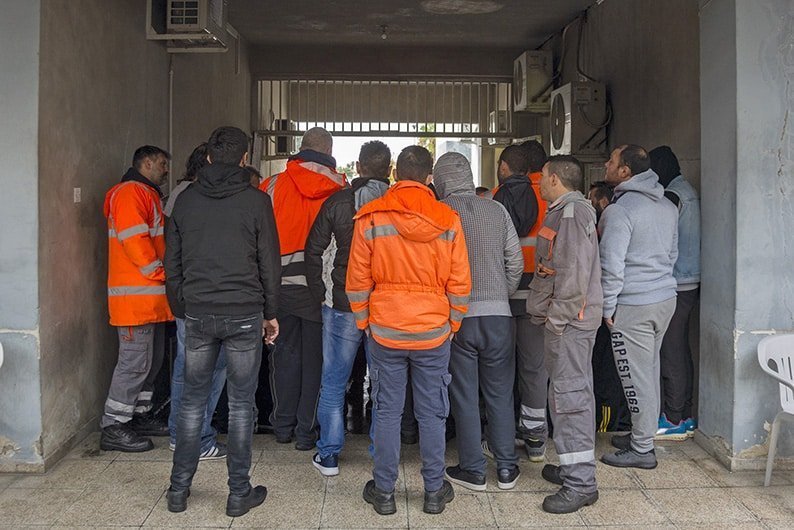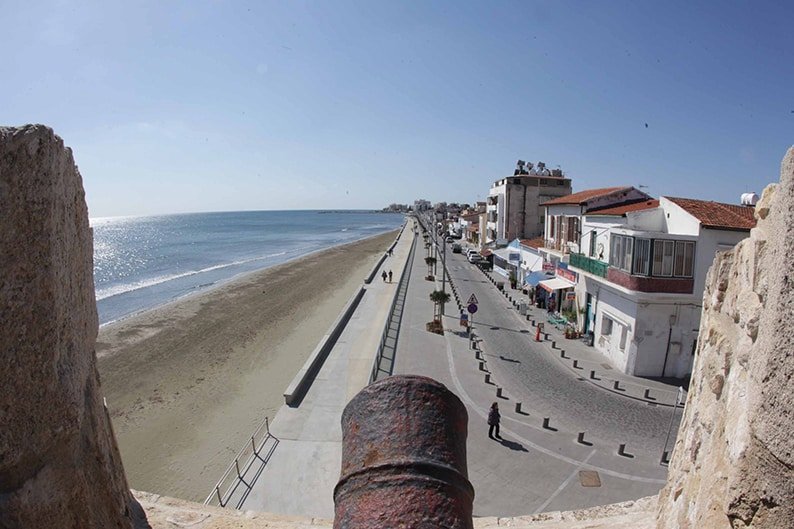THE BIRTH of another Kyproulla sacred calf was announced on Thursday at the Cyprus-Greece-Israel trilateral summit, in Beer Sheva in the Negev desert in Israel – the EastMed pipeline. By the next day, in Nicosia the calf had grown in into a sacred cow, media treating the EastMed with the same awe and respect they usually reserve for Gesy.
Newspaper commentators were already urging the doubters and detractors of the pipeline to keep their thoughts to themselves, because this development could act as a counterweight to Turkey’s arrogance and, possibly force it to show more flexibility on the Cyprob if it did not want to be left out of the region’s energy plans. We have been warned.
The only people bothered by the discussion of the EastMed were those that have taken the decision that “Cyprus must co-operate with Turkey, be transformed into a Turkish protectorate and abandon any other effort,” wrote one columnist, making it very clear that any doubt voiced, would come from people that wanted us to become a Turkish protectorate.
Gas and oil expert, Charles Ellinas, who had said the EastMed was more pipe-dream than pipeline, a few weeks ago will presumably have to modify his view to avoid being classed as a Turkish protectorate champion now that the pipe-dream has become a sacred cow.
US AMBASSADOR to Israel, David Friedman, was also present at the summit indicating the project also had the blessing of America. Reports also made much of the fact that Friedman was a close associate of President Donald Trump, having worked as an advisor in his election campaign, and getting the ambassadorial post as a result.
The fifth trilateral summit reached agreement on the inter-state declaration for the pipeline, which has now been forwarded to the European Commission for its comments. It was the first step towards its implementation, said foreign minister Nicos Christodoulides, although he highlighted a second “significant thing” arising from the summit.
It was the agreement for the creation of a permanent secretariat in Nicosia for all trilateral alliances, which, according to Christodoulides, has the aim of eventually bringing all the trilateral alliances struck by Prez Nik into one mega, multilateral alliance on regional security and cooperation. In this way there would be “added value” said the churchgoing minister, on Trito.
Delusions of grandeur have always afflicted our politicians who now believe they will create an alliance of security and cooperation, involving Israel, Egypt, Jordan, (Lebanon and the Palestinian Authority), under the guidance of Prez Nik, the visionary peacemaker. We can call it the East Mediterranean Treaty Organisation (EMTO) and one day it could become a mini-Nato.
THERE is even a master plan for achieving this and creating the added value for the participating countries, according to Makarios IV, who, in a rare show of pragmatism, acknowledged it would be difficult to bring all the countries invited into threesomes by our Prez into a multilateral alliance run by the secretariat.
A small first step would be taken by the secretariat promoting agreement on low politics issues. For instance, Prez Nik’s initiative on climate change could be a starting point, said the foreign minister. Our prez has an initiative on climate change?
What does it involve? Stopping global warming in the eastern Mediterranean through island-wide prayers under the Archbishop, preventing dust arriving in Kyproulla from the deserts of our alliance partners, or issuing Cyprus passports to individuals that drive low-emission cars?
Once the trilateral states reach agreement on climate change and relations among them are improved, the secretariat would deal with “more strictly political” issues, said Mak IV, who did not to put a time-frame on the fruition of his boss’ visionary plan for regional security and cooperation.
The only danger now is that Bashar al Assad might be so impressed with Nik’s climate change initiative he would start agitating for Syria to enter a trilateral alliance with us, which might not go down well in Israel.
“CREATION of multilateral force to protect the EastMed pipeline, decided the trilateral summit in Israel,” declared the CyBC news on Friday morning, in what sounded as a classic bit of fake news.
Quoting diplomatic sources, the corporation’s correspondent covering the summit in Beer Sheva, Paris Potamitis, said that the “aim was for all countries whose companies are involved in the procedure of EastMed to participate in the multilateral force so there is collective responsibility and effort.”
As Noble Energy and Exxon Mobil were involved, it was expected that the US would participate in the multilateral force for the security of the EastMed pipeline, reported Potamitis. The viability of the EastMed had not yet been established, adequate quantities of gas had not yet been found in the region, there are no plans for its construction, but Potamitis’ diplomatic sources had set up a multilateral force, led by the US, to offer the pipeline security.
What was even more peculiar that after this news was reported, Christodoulides was a guest on the same radio show and was not asked anything about our military alliance with the US, Israel, Greece and Italy. The foreign minister spoke about the geopolitical dimension of the agreement and the interest of the US in its energy and security aspects, without saying anything about the multilateral force.
I won’t say anything else in case I am accused of opposing the multilateral force and supporting Kyproulla becoming a Turkish protectorate.
THE STORY about the multilateral force was only marginally less plausible than the report featured on the front page of last Monday’s Phil about an African man being beaten up outside his home in Larnaca, at 4am, by five men wearing white hoods.
The five, were in a car parked outside the African’s house, which was close to the town’s police station. As he approached, they “jumped on him, immobilised him and started hitting him in different parts of his body. Subsequently, they opened his mouth and with the use of pliers managed to remove four of his teeth.”
The attack took place “with lightning speed, but the shouts, like the screams of the African, it seemed did not bother any of the neighbours, because no call was made to the police for help,” reported Phil. The paper said the attack was “reminiscent of the way the Ku Klux Klan acted against blacks in the US,” given that the assailants were wearing white hoods.
The police had no report of the incident and were unable to confirm it took place. According to Phil, the victim chose not to go to the police because when he had gone to the police in the past he had been treated in a racist way. Why no neighbour ran to his help after hearing his screaming and shouting it did not say. Perhaps they were all afraid of the KKKK, the Kyproulla Ku Klux Klan.
LAWYER Nicos Clerides came up with quite an amazing conspiracy theory in trying to defend his brother, the attorney-general, in an exchange on Facebook. He responded to a post, directed at the AG following the acquittal of two executives of the Bank of Cyprus.
The post accused the AG of being an “accessory to the economic crime,” and added: “You have been registered as yet another criminally inadequate, though highly-paid employee at the service of corrupt, politico-economic nomenclature.”
The AG’s brother took such offence he responded. “The nomenclature, as you call it, and the favouritism exist and the only one fighting them are the attorney general and auditor general. This favouritism, unfortunately has expanded to the judiciary. Our courts are controlled by the ‘Chrysafinis and Polyviou’ law office. There is no judge of the supreme court that does not have offspring at the law office which promotes the interests of the banks. Wake up.”
It was a sweeping generalisation you would not expect a lawyer to make, as he implied all judges of the supreme court were corrupt or at best, lacking integrity. Any one of them could sue him for defamation. And another thing, is it possible that all supreme court judges would have kids working for Polys Polyviou?
Nicos did not consider the possibility that his bro lost those cases because the AG’s office did a lousy job, as family loyalty always comes ahead of rationality.
FOLLOWING the example of his former health minister Giorgos Pamborides, Prez Nik also implied that private doctors were against Gesy because they wanted to carry on evading tax. If they joined Gesy, their incomes would be monitored he said in a TV interview and suggested they submitted their tax declarations of the last seven years, “so they could be rewarded accordingly within the Gesy framework.”
As we know, lawyers are perfectly placed to pass judgment on the tax behaviour of doctors, because lawyers belong to the only profession that never cheats the taxman. Nik’s televised moralising, did not stop at the issue of tax evasion. He also questioned the morals of doctors, giving them a brief lesson on the Hippocratic Oath.
Those who took the Hippocratic Oath, should have been more humble he said, because being a doctor “was not just to get rich, but also to serve.” They should follow our Prez’s example who never took any oath, but always put serving the people above money and becoming rich.























